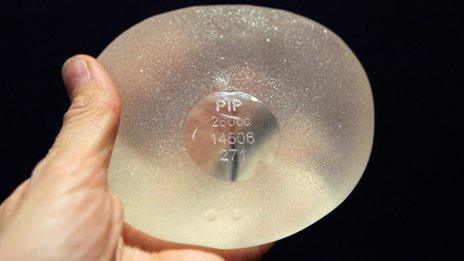NHS shift on implants
- Published
- comments

PIP implants were banned in 2010 as they contain unauthorised silicone filler
The government position on the safety of PIP implants has not changed, but there has been a dramatic shift in the way it is dealing with this issue.
The reason is the committee advising the Health Secretary Andrew Lansley has said the anxiety women may be experiencing has to be taken into account.
The committee, led by Sir Bruce Keogh, NHS Medical Director, concluded that the worry caused to women by having untested implants in their body is itself a form of health risk.
As a result, women treated on the NHS - will be offered removal and replacement implants if women decide that's what they want after a scan and consultation with their surgeon. All those treated on the NHS will have been cancer patients undergoing reconstructive surgery.
The government expects the private clinics - who carried out 95% of the surgery - almost all for breast enlargement - to do the same.
Moral duty
But if private clinics no longer exist or refuse to help, then the NHS will remove the implants, but will not replace them.
The Health Department said private clinics had a moral and a legal duty to help its patients.
Spire Healthcare and Nuffield Health have both said they will offer free replacement implants if that's what women want.
But it's not yet clear though whether other health firms will follow suit.
The government decision places immense pressure on the private sector to provide free replacement treatment - if they fail to do so it could be a public relations disaster.
But it is worth stressing the position here is different from that in France, Germany, the Czech Republic and other countries who are recommending removal of the implants as a precaution.
Ministers here maintain there is insufficient evidence to recommend routine removal of the implants. The advice from the expert committee has now been published., external
Anxiety
This is the key section on page nine of the review report which is leading to a change in the way the issue is being dealt with:
"Whatever the objective evidence on safety, many women with PIP implants will understandably be very worried about the possible implications for their health. In itself, this anxiety is a form of health risk and must be addressed with understanding and compassion by those responsible for their treatment......The NHS will support removal of PIP implants if, informed by an assessment of clinical need, risk and the impact of unresolved concerns, a woman with her doctor decides that it is right to do so. The NHS will replace the implants if the original operation was done by the NHS.....The group (ie the expert committee) endorses this offer. It expects providers in the private sector to take similar steps.
The Department of Health is keen to stress that if the NHS has to step in to treat private patients it will do all it can to recover the costs of surgery from the private sector.
How much all this will cost is hard know. If 40,000 women wanted their implants replaced at £5,000 a time that would come to £200 million.
The expert committee makes it clear that the issue of safety has not been settled because inadequate data has been provided. It says:
"On the currently available information, the group considers that the statistical evidence on the rate of ruptures for PIP implants compared with other implants is incomplete and this risk cannot be assessed accurately. For this reason it is unable to come to any view on comparative rupture rates."
This issue clearly has a long way to go and women treated in the NHS and private sector must now begin to consider what they want to do.
- Published6 January 2012
